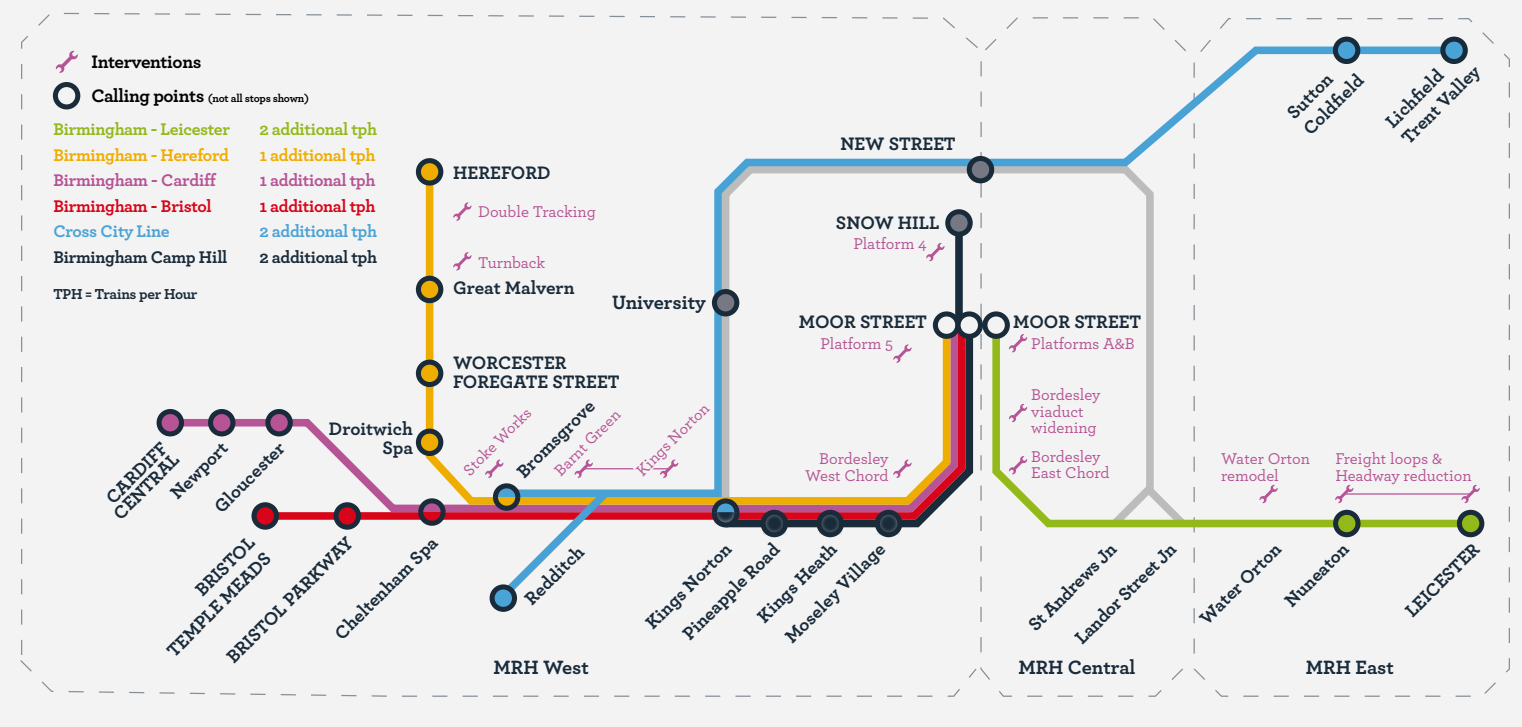The Midlands Rail Hub is a transformative infrastructure project designed to enhance rail connectivity across the Midlands region of the UK. By improving rail services and increasing capacity, the project is set to deliver substantial economic benefits, driving regional development, boosting employment, and fostering long-term economic growth.
Midlands Rail Hub Map

Key Economic Benefits Summary
| Benefit | Details |
|---|---|
| Job Creation | 12,750 new jobs and 300 apprenticeships [1][3] |
| Economic Value | £240 million in supply chain value [1][3] |
| Social Value Uplift | £45 million from upskilling and employment [1][3] |
| Rail Capacity Increase | 10 additional trains per hour, 14.6 million seats annually [2][3] |
| Investment Return | £1.50 return for every £1 invested [3] |
| Reduced Car Travel | 29.3 million fewer car miles per year [2] |
| HS2 Integration | Connects 1.6 million more people to HS2 [2] |
Enhanced Connectivity
A core feature of the Midlands Rail Hub is its potential to improve rail connectivity between major cities such as Birmingham, Bristol, Cardiff, Leicester, Derby, and Nottingham. Enhanced rail links will facilitate more frequent and reliable services, fostering greater business collaboration and investment across the region. By reducing travel times and enhancing reliability, the project will position the Midlands as a more attractive destination for businesses and investors [2][3].
Job Creation and Skills Development
The project is expected to generate over 12,750 new jobs, including skilled roles in engineering, project management, and rail operations. Additionally, more than 300 apprenticeships will be created, helping to cultivate a highly skilled workforce. This investment in human capital will ensure the long-term sustainability of the region’s infrastructure sector, supporting future rail projects [1][3].
Economic Value Generation
Economic forecasts suggest that the Midlands Rail Hub will inject £240 million into the regional economy through its supply chain operations. An additional £45 million in social value is projected due to upskilling, enhanced job security, and sustained employment opportunities. These investments will create a positive feedback loop, boosting regional spending and supporting local businesses [1][3].
Increased Rail Capacity and Efficiency
The project will add up to 10 additional trains per hour on key routes, creating over 14.6 million more seats annually. This increased capacity will improve access to job opportunities, enabling businesses to tap into a broader talent pool. Enhanced rail services will also reduce road congestion, lowering emissions and contributing to environmental sustainability [2][3].
Improved Journey Times
Reduced travel times between major cities will enable faster and more efficient business travel. This improved mobility will expand access to markets, increase productivity, and create new economic opportunities. It will also enable businesses to operate more efficiently, reducing costs associated with delays and unreliable transport links [2][3].
Investment Return and Long-Term Impact
The Midlands Rail Hub is projected to deliver a return on investment of £1.50 for every £1 spent. Over the next seven years, the project is expected to generate an additional £2.64 billion in economic value through job creation and increased productivity. Moreover, by 2045, the Midlands is projected to see the development of 30,000 new homes and 167,000 new jobs, driven by improved transport infrastructure [3][4].
Supporting HS2 Integration
The project will enhance access to the HS2 rail network, connecting an additional 1.6 million people to high-speed rail services. This integration will amplify the economic impact of HS2, creating a more interconnected and efficient national rail system [2][3].
Environmental and Social Value
The project is expected to reduce car travel by 29.3 million miles annually, leading to lower carbon emissions and environmental savings. This reduction will contribute to the UK’s broader sustainability goals while generating cost savings for commuters [2][3].
Conclusion
The Midlands Rail Hub is more than just a transport project—it is a catalyst for economic growth and regional development. By enhancing connectivity, creating jobs, and stimulating investment, it promises to reshape the Midlands economy and support the UK’s infrastructure ambitions well into the future.
Citations:
- https://www.midlandsconnect.uk/news/midlands-rail-hub-will-deliver-employment-and-economic-boost-new-figures-show/
- https://www.wmca.org.uk/news/midlands-rail-hub-proposals-to-deliver-more-rail-services-and-better-journey-times/
- https://www.midlandsconnect.uk/projects/rail/midlands-rail-hub/
- https://www.gov.uk/government/news/work-to-deliver-midlands-rail-hub-set-to-begin-with-123-million

